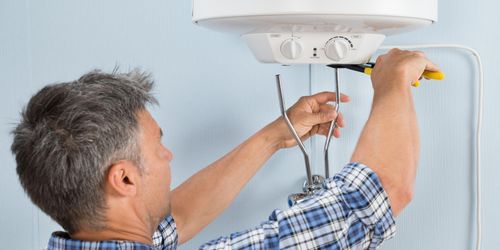Managing the Chief Water Heater Crisis Events
Managing the Chief Water Heater Crisis Events
Blog Article
We have come across this post on Is Your Water Heater Leaking? down the page on the web and thought it made good sense to talk about it with you here.

A hot water heater is just one of the most vital fundamental appliances that can be located in a house. With water heaters, you do not need to experience the anxiety of heating water by hand each time there is a demand to take a bath, wash, or the meals. However, there is constantly a possibility that your hot water heater would break down as with the majority of mechanical devices.
It is very important to keep in mind any little malfunction and also tackle it quickly before points leave hand. A lot of times, your hot water heater starts to malfunction when there is an accumulation of sediments as a result of constant usage. As a precaution, routine flushing of your hot water heater is recommended to stop debris buildup as well as prevent practical failure.
Typical water heater emergency situations and also just how to take care of them
Inadequate warm water
Handling an inadequate supply of warm water can be aggravating. It may be that the water heater can not support the hot water need for your home. To take care of this issue, you could attempt to adjust your heating system's temperature dial and also wait on a few mins. If the trouble continues, you can request for the help of an expert plumber. Alternatively, you might update your hot water heater to one with a larger ability.
Rising and fall water temperature level.
Your water heating system can begin generating water of various temperatures typically ice cool or hot hot. There might be a requirement to change either the home heating or the thermostat device of your water heating system.
Dripping water heater tank.
In this circumstance, you need to turn off your water heating system, permit it to cool down, as well as carefully look for the source of the problem. At times, all you require to do is to tighten up a few screws or pipe connections in instances of small leaks. If this doesn't work and the leakage persists, you may need to employ the services of a specialist for a proper replacement.
Tarnished or odiferous water
When this happens, you need to understand if the problem is from the tank or the water resource. If there is no amusing scent when you run cool water, after that you are specific that it is your water heating unit that is damaged. The smelly water can be created by corrosion or the build-up of germs or debris in the water heating system container.
Final thought
Some house owners neglect little caution as well as minor faults in their water heater system. This just results in further damages as well as a possible full malfunction of your appliance. You need to manage your hot water heater mistakes as soon as they come up to stay clear of more expenses and also unneeded emergency troubles.
With water heating systems, you do not need to go through the stress and anxiety of heating water by hand every time there is a need to take a bathroom, do the laundry, or the dishes. It might be that the water heating unit can't sustain the hot water demand for your home. Your water heating unit could begin creating water of different temperature levels typically ice scalding or cool hot. If there is no funny scent when you run chilly water, then you are specific that it is your water heater that is damaged. The smelly water can be created by rust or the buildup of germs or debris in the water heating unit container.
Common Water Heater Issues and What You Should Do
What Type of Water Heater Do You Have?
Before we begin it’s first important that you identify the type of water heater you have on your property. There are two main types of water heaters out there: conventional and high efficiency.
Both of these types of products typically use either gas or electricity to heat power. There are also solar water heaters that use a thermal collector on the roof or yard to heat the water.
While these models are not as common, they can cut heating costs in half. In this article, we will focus on conventional and high efficiency.
How Do My Electric and Gas Water Heater Work?
Though they look similar, electric and gas water heaters work very differently. It’s important to know their basic function because often problems can be specific to the heating source.
In the electric model, a thermostat on the side of the machine detects the temperature of the water in the tank. When the temperature needs to rise electricity flows to a heating element suspended in the water.
Gas models also use a thermostat device — typically with a mercury sensor at the tip and an additional sensor called a thermocouple. The thermocouple detects whether the pilot light is on and controls the flow of gas.
When the thermostat drops below the appropriate level gas is released which becomes ignited by the pilot light. The flame heats the bottom of the water tank which causes hot water to rise and cold water to drop.
This natural circulation continues until the water reaches the desired temperature. Then, the thermostat triggers the gas control valve to shut off the flow of gas.
What Are the Most Common Issues and How Do You Fix Them?
https://happyhiller.com/blog/common-water-heater-issues-and-what-you-should-do/

I found that post about Common Hot Water Heater Problems when doing a search on the search engines. Liked our review? Please share it. Let other people discover it. Thanks a lot for your time. Visit us again soon.
Quick, reliable, call! Report this page